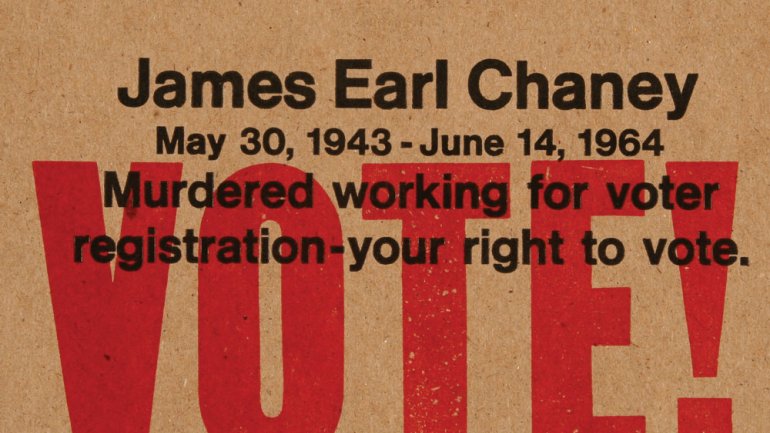Words to Live By
Words to Live By
Letterpress printer Amos Paul Kennedy Jr. brings phrases, proverbs, adages, and ideas to life in simple, striking books and posters.
Amos Paul Kennedy Jr. turns the handle on the Vandercook SP-15 and one of the first posters rolls off the letterpress.
"Oh, that's bad," he says, noticing a piece of type that isn't playing well with the others. "It's four and a half picas down. It's that one. I'll pick you up, put you down, and go."
He loosens the type, moves the offending piece, and locks the type into place. He turns the handle again.
"That's beautiful," he says.
Dressed in denim overalls and one of his trademark pink shirts, Kennedy is as unpretentious as his art. He lives and works in Gordo, Alabama, a rural enclave about 20 miles from Tuscaloosa and some 60 miles from Birmingham.
The art he creates harkens back to a time gone by. It's made from handset wood and metal type, oil-based inks, and eco-friendly chipboard. Posters fetch $25 from admirers, $10 apiece for those who buy more than one. The posters urge women to be civil in the ladies' room, scream that coffee will make you black, and celebrate civil rights, past and present.
A bestseller: "I was born so poor if I had not been a boy, I would have had nothing to play with."
"He pushes the boundaries," says Christopher Battaglia, interim curator for Community Folk Art Center, a program of the African American Studies Department at Syracuse University. "He likes to startle people into looking at the world around them."
In early 2011, the center was host to "Amos Kennedy Prints!" and, as part of the exhibition, allowed visitors to make their own art on a letterpress and take it home with them.
A few weeks later, Kennedy got a phone call from CB2, Crate and Barrel's trendy sister store. Executives commissioned him to create Accept and Be, a series of limited-edition letterpress prints in celebration of Gay Pride Month in June.
Kennedy's work finds an audience, Battaglia says, because it's both art and craft. There's art in the printmaking; craft in the messages he prints. The work is comfortable and familiar, allowing collectors to interpret and connect with it in their own way.It's all part of Kennedy's plan. "The story, the message, or the meaning of the story is better served if you let people discover it themselves," he says. The printer used to search for proverbs, sayings, and quotes. Now, 20 years into his career, the words find him. Collectors slip him tiny pieces of paper scrawled with messages. Kennedy adds each one to a growing list of phrases. He doesn't have to like them. It's enough to know someone thought enough about the phrase to give it to him.
"If you like it, there are 99 other people who will like it," he says.
Kennedy, 61, was born in Lafayette, Louisiana, the middle child of five, and raised in a Grambling, Louisiana, home where achieving an academic degree was expected; his mother and father earned doctoral degrees in accounting and chemistry, respectively.
Kennedy went into computer programming. Then, in 1989, he visited Colonial Williamsburg with his two sons. While there, he saw a printing press demonstration. Within three months of the trip, he was printing his own work. A year later, he left the job he had had for 18 years.
"I found this, and this is what I'm supposed to do. I fell in love with the stuff. I was completely blown away by it."
Kennedy enrolled at the University of Wisconsin-Madison to study under Walter Hamady, a legendary book designer and papermaker, and earned an MFA in 1997. He later taught graphic design at the Henry Radford Hope School of Fine Arts at Indiana University, before heading back home to the Deep South and dedicating himself to printing full time.
Laura Zinger learned about Kennedy's work while she was an English literature student at the University of Illinois at Urbana-Champaign. She was working in the Rare Book and Special Collections Library when she asked head librarian Barbara Jones about the most interesting book in the collection.
Zinger thought Jones might pull out the book of Genesis printed on a Gutenberg press, but she chose two of Kennedy's: his snake necklace - a charm book of African proverbs meant to be worn around the neck, each page cut in the shape of a snake for wisdom - and a whipping stick that he had constructed out of shredded Bible pages.
"I was floored," Zinger says. "I'd never seen anything like either of these ‘books' before." She was so impressed that she asked Jones to arrange a meeting with Kennedy for her. The two met and kept in touch for seven years, before she asked him if he would be the subject of a documentary.
Kennedy obliged, and Zinger, owner of 20K Films, directed and produced Proceed and Be Bold! in 2008. The documentary, which has won critical acclaim, continues to introduce people to Kennedy and his art.
"I was told years ago that everything you do is political," Kennedy says, "and so my art is really a political statement. And the story of my art, when someone can actually cipher it out, is a statement of what I envision the world to be.
"One is that every piece is unique because every individual is unique. There is no such thing as a mistake. There are just happy coincidences. This is what happened at the moment of creation."
The same can be said of Kennedy.
Monique Fields is a folk-art lover and writer in Alabama.

